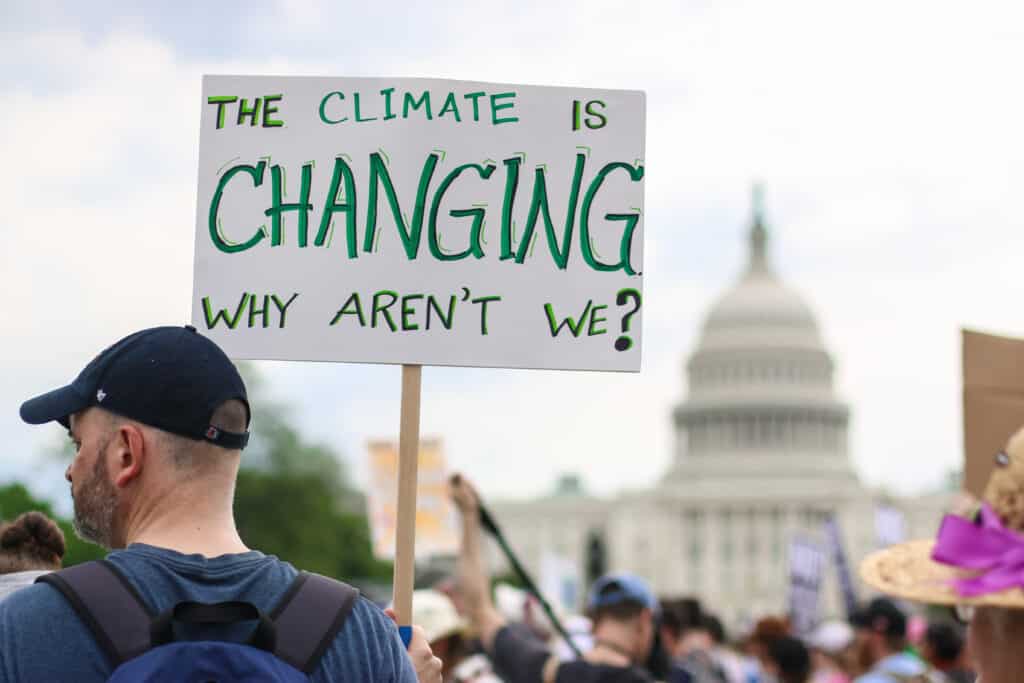
- Climate change is important to voters, but isn’t one of their top concerns, say USC experts
- Worsening wildfires, hurricanes and heat waves are convincing more people around the world that climate change is real and dangerous.
- While the number of Americans concerned about climate change is increasing, other issues like the economy and threats to democracy rank higher for voters.
A new United Nations report says that glaciers across the globe — including Mount Kilimanjaro’s and those in the Alps and Yosemite National Park in California — will vanish by 2050 due to climate change.

Another new report released by the UN Environment Programme found that by 2030, developing countries will need up to $340 billion per year to adapt to climate change. Last week, the UN said the world isn’t cutting greenhouse gas emissions enough to avoid potentially catastrophic sea level rise, among other perils.
The alarming reports are being issued in the lead-up to the 27th Conference of the Parties (COP27), the UN’s annual climate conference taking place in Egypt this year.
Despite those headlines, political candidates and campaigns are hardly talking about climate change ahead of the 2022 midterm elections, says Mindy Romero, a research assistant professor and the director of the Center for Inclusive Democracy at the USC Price School.
“While it is certainly a critical topic for many Americans and our nation, it often does not register in surveys as a top issue for older, higher turnout voting groups that are courted by candidates and campaigns,” Romero observes.
Climate change not a high priority for voters in this election cycle
“Right now, the climate issue is more important in reality than it is politically,” says Robert Shrum, professor of the practice of political science and director of the USC Dornsife Center for the Political Future.

Even younger voters seem more motivated by reproductive rights and perceived dangers to American democracy, he says.
In a recent Pew Research Center survey, 79% registered voters say the economy is very important when making their decision about who to vote for in the 2022 congressional elections, the highest share of any of the issues the survey asked about. The future of democracy was second, with 70% of registered voters saying it is very important to their midterm vote.
Only 38% of registered voters said climate change was very important to their vote.
“Climate change is an existential threat and the young do care deeply about it,” said Shrum. “It just doesn’t rank as high as a reason for them to vote in 2022.”
Outside of a $12 million advertising campaign by a national environmental group aimed at turning out “climate voters,” political ads focused on climate change have been rare during this election cycle. The University of Virginia’s Center for Politics tracked 350 ad campaigns in September 2022 and found abortion and crime were the primary issues addressed.

“Politicians do a really good job of making people fearful of other things,” says Joe Árvai, a professor of psychology and director of the Wrigley Institute for Environmental Studies at the USC Dornsife College.
In this election cycle, those include the economy, threats to the First and Second Amendments, immigration, and the so-called “radical left,” he says.
“We’re not seeing the kind of fear and dread about climate change relative to these other issues in enough voters,” explains Árvai. “It just feels too far away, in time and space, for many voters. Hence the low concern and limited strength of climate change as a ballot issue.”
Árvai says researchers with the USC Wrigley Institute are looking more closely at the psychological variables that lead people to perceive high climate risk and behave accordingly, as well as how to slow the spread of misinformation about climate change online.
A shift in climate change risk perception
Climate scientists have warned about climate change for decades, says Wändi Bruine de Bruin, Provost Professor of Public Policy, Psychology, and Behavioral Science at the USC Price School. But for almost as long as scientists have sounded the alarm, there was “worldwide apathy or lack of awareness” about climate change, she says.
But in recent years, there’s been a shift.

Bruine de Bruin’s research, published in the journal Climatic Change in April 2022, shows a majority of people around the world — 69% — say that climate change is a “somewhat serious” or “very serious” threat.
One reason for the pivot: More and more people are seeing the effects of climate change in their own communities, she says.
A recent example is the devastation wrought in Florida by Hurricane Ian, one of several hurricanes in recent years to undergo rapid intensification, which scientists say is linked to human-caused climate change.
“There are wildfires; there are hurricanes; there are heat waves. But why is it not coming up in the midterm elections? I am puzzled,” says Bruine de Bruin.
Reflecting on the absence of climate change from the issues being discussed ahead of the elections, Bruine de Bruin observes that while climate anxiety is high, there are other pressing things people are concerned about, including inflation.
“If you can’t eat today, or meet your other needs, climate change may not be as pressing, even if you realize it’s happening and you’re concerned about it,” she says.
Maybe climate change will have its moment in the 2024 Presidential Election.
Bruine de Bruin’s research published in the journal Climatic Change in April 2022 was funded by the Lloyd’s Register Foundation.